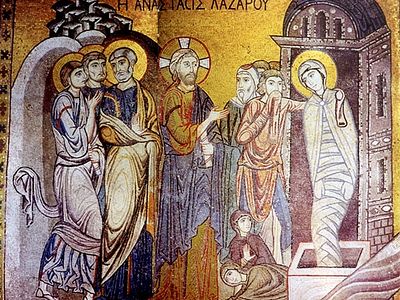The Gospel of John verse 11:35 is one of the shortest verses in the Bible. It consists of two words: Jesus wept. The verse is brief, but it should be read slowly. Just two words, but each one is precious.
In the first verses of his Gospel the apostle John writes that The Word became flesh (Jn. 1:14). He continues to witness to this here also, in relating the events surrounding the resurrection of righteous Lazarus. Jesus wept, and that means that truly the Son of God became the Son of Man, like us in everything except sin. This includes the ability to weep.
Jesus wept. These two words show that God arranged the salvation of people not coldly and indifferently, not because he had to, was forced to, but because he desired this fervently. Christ’s tears reveal the Lord’s inner world: He loves His creation, He grieves that death deforms people, separates them from one another, brings anguish and melancholy into the world, and deprives people of happiness.
Jesus’s tears remind us that God is not a stranger to the world, that He is not an indifferent Absolute, as the Greeks once thought. Their monotheistic philosophy described God as a totally passionless Being. Rightly supposing that God is completely perfect, they came to the conclusion that He could not change in any way. After all, any change would mean a departure from the Ideal. The philosophers considered feelings to be a kind of change. A feeling God is a God Who suffers from feelings—which, as the Greeks thought, means He is not God.
So, Jesus’s tears show that God does not fit into the framework of human deductive reasoning. He after all loves us, co-suffers with us, and worries about us with a deeply personal, fatherly interest, while remaining perfect God—all powerful and almighty.
Never say to your crying little sons that men never cry. This is not true. The best of men have wept. The Best of the best also wept.
Jesus’s tears teach us not to be ashamed to weep. If Christ was not ashamed, even less so should we be ashamed. If only our tears would always be as pure, noble, and compassionate. Such weeping is pleasant to God. But there are tears of envy, hatred, unforgiven offenses, dark depression, or drunken declarations. Such tears have nothing in common with Jesus’s tears. We have no need for them.
Christ’s tears tell us that God wants to co-suffer with us to the full extent. It was not enough for Him to weep from the heavens over our disaster. No, He came down to us, entered the crowd of weepers and wept with them, providing an example, establishing the commandment that the apostle Paul would later clothe in words.1
We can also suppose that having seen the funereal setting, seeing the human grief, He was transported to the future with His divine mind to when His most pure body, killed by Jewish malice, would also be laid in the grave, and His disciples both men and women would be crushed with grief. Perhaps His tears were over this as well.
The Lord Christ’s actions reach through the ages. Weeping with Martha and Mary at the tomb of Lazarus, He weeps also with us at the burials of our family and friends. We are not alone, no matter how the devil tries to suggest otherwise. However there is a time to weep and a time to laugh (Eccl. 3:4). The Lord raises Lazarus and wipes away both His own and our tears. For, all is well that ends well. It will be well for us—He will resurrect our close ones, too. And He will resurrect us.






